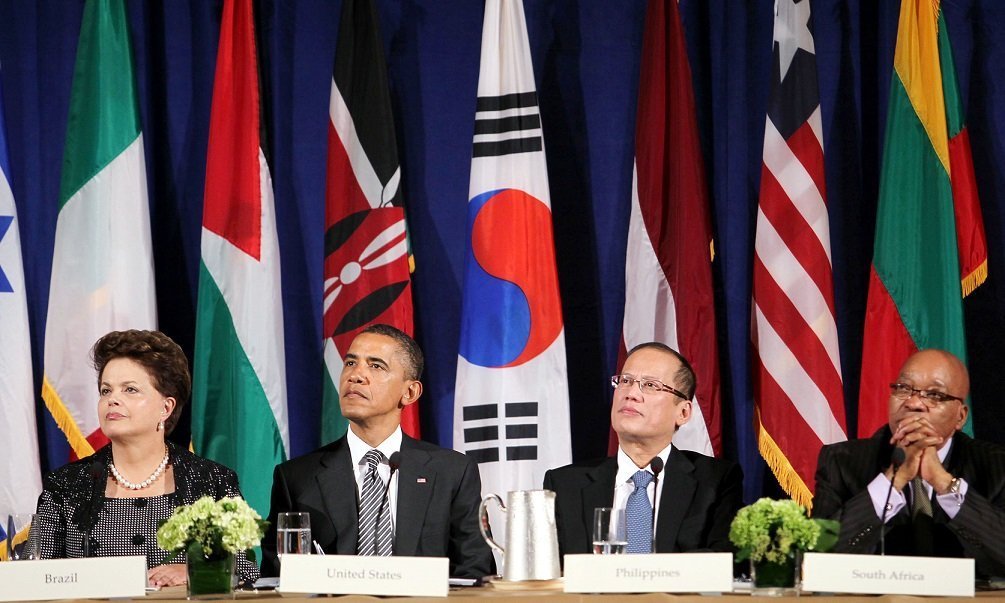
OPEN GOVERNMENT
Open government is the governing doctrine which holds that citizens have the right to access the documents and proceedings of the government to allow for effective public oversight.[1] In its broadest construction it opposes reason of state and other considerations, which have tended to legitimize extensive state secrecy. The origins of open government arguments can be dated to the time of the European Enlightenment: to debates about the proper construction of a then nascent democratic society.
Among recent developments is the theory of open source governance, which advocates the application of the free software movement to democratic principles, enabling interested citizens to get more directly involved in the legislative process. The concept of Open Government is broad in scope but is most often connected to ideas of government transparency and accountability.
For more about Open Government
OPEN GOVERNMENT PARTNERSHIP
The Open Government Partnership (OGP) is a multilateral initiative that aims to secure concrete commitments from governments to promote transparency, empower citizens, fight corruption, and harness new technologies to strengthen governance. In the spirit of multi-stakeholder collaboration, OGP is overseen by a Steering Committee including representatives of governments and civil society organizations.
The OGP stakeholders include participating governments as well as civil society and private sector entities that support the principles and mission of OGP. The four core OGP principles are:
- Citizen Participation – governments seek to mobilize citizens to engage in public debate, provide input and make contributions that lead to more responsive, innovative and effective governance. \
- Transparency – information on government activities and decisions is open, comprehensive, timely, and freely available to the public and meets basic open data standards.
- Accountability – there are rules, regulations and mechanisms in place that call upon government actors to justify their actions, act upon criticisms or requirements made of them, and accept responsibility for failure to perform with respect to laws and commitments.
- Technology and Innovation – governments embrace the importance of providing citizens with open access to technology and role of new technologies in driving innovation, and the importance of increasing the capacity of citizens to use technology.
OGP formally launched on September 20, 2011, when the 8 founding governments (Brazil, Indonesia, Mexico, Norway, the Philippines, South Africa, the United Kingdom and the United States) endorsed the Open Government Declaration, and announced their country action plans. By early 2018, 75 OGP participating countries and 15 subnational governments have made over 2,500 commitments to make their governments more open and accountable.
For more about Open Government Partnership
WHY VIETNAM SHOULD JOIN OGP?
As an international initiative on strengthening governance, OGP has positive implications for all member states. OGP can help Vietnam:
- Build the trust of the people on the leadership.
- Speed up the reform of State management
- Strengthen the nation’s image and reputation in the international community and the business community.
- Utilize support and assistance of international community and the people to improve the effectiveness of public governance.
- Effectively implement international treaties and national legal documents on corruption prevention and control.
- Further promote constructive cooperation between the state and civil society in improving the quality of public governance.
- Position itself in the competition in ASEAN and globally to attract high quality FDI.
OGP has been in line with Vietnam’s context because the four components, including budget transparency, access to information, asset disclosure, and civic engagement, are closely linked to existing such national action plans as the National Strategy on Anti-Corruption until 2020, the Politburo’s Resolution on the Judicial Reform Strategy to 2020, the UN Convention Against Corruption Corruption-UNCAC (especially emphasis on the role and participation of society), Law on Access to Information (in validity since 1st June, 2018)
Vietnam is expected to become a member of the OPG. By the end of 2017, Vietnam lacks 4 points, which is not too far away from meeting the minimum eligibility criteria of becoming an OGP member. As a late comer, Vietnam can benefit largely from the pool of experience from the current 75 participating OGP members and OGP support mechanisms

